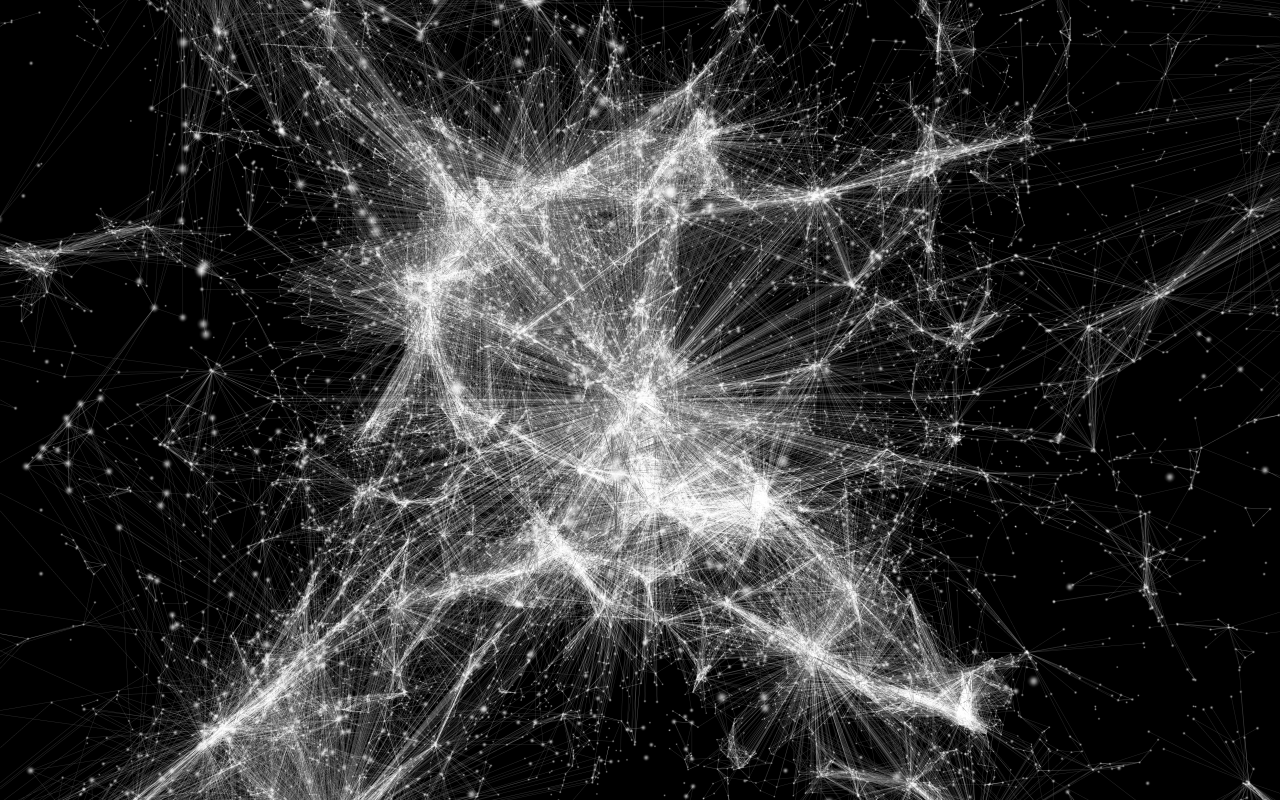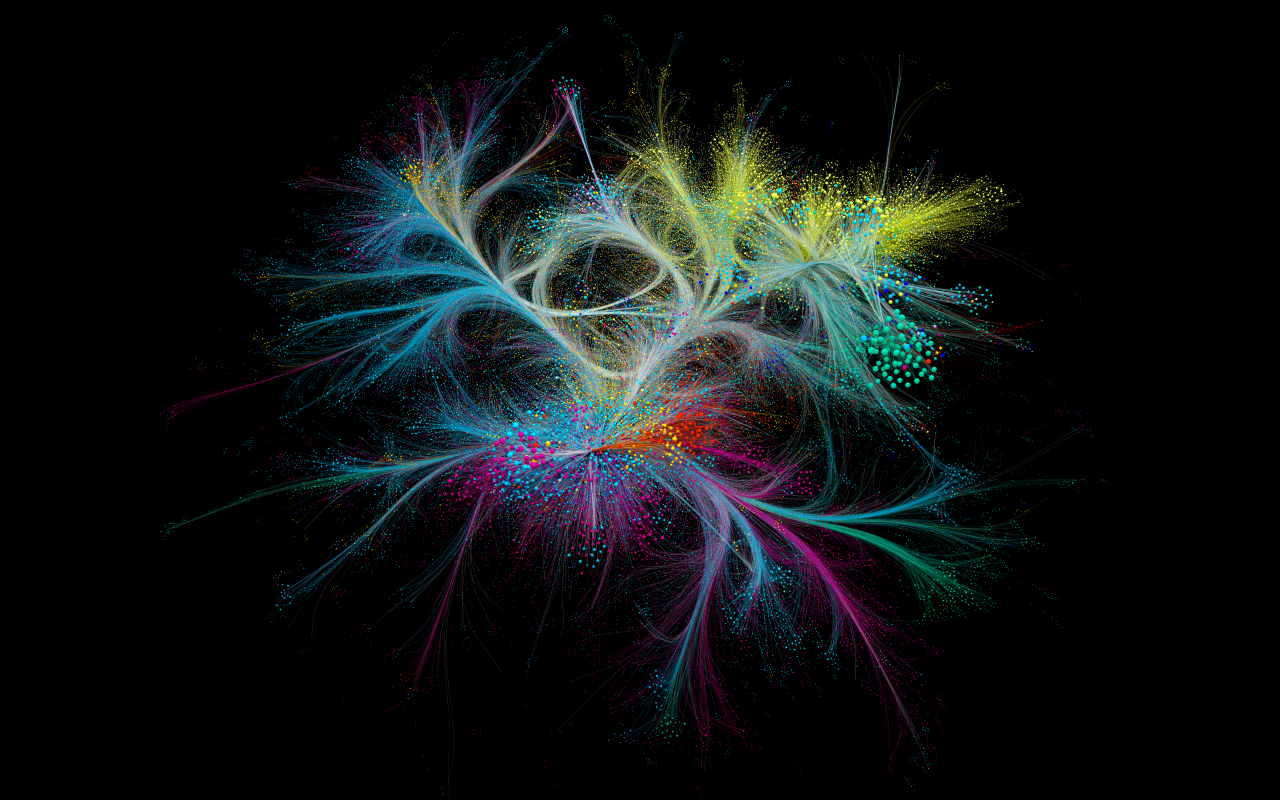
Languages: German, English
The exhibition »BarabásiLab. Hidden Patterns« presents network visualizations of the last 25 years of the physicist and network scientist Albert-László Barabási and his research laboratory.
Economic, social and political infrastructures have long been built on the algorithmic analysis of data. In order to be able to cope with these huge amounts of data, network science has been established, which illustrates and explains the systemic relationships within various data sets. BarabásiLab's projects provide insights into the highly topical fields of network science, which are amongst others used in medicine, pharmacy, and physics, but also in fields such as the study of infrastructures, social systems and developmental processes. By making visible the hidden connections and repeating patterns within nature, society, and culture, the innovative and interdisciplinary field of network science enables the analysis of a wide variety of cultural and social phenomena.
Program
6 pm | Guided tour through »BarabásiLab. Hidden Patterns« with Albert-László Barabási
Realized in cooperation with the Ludwig Museum in Budapest, Hungary, this exhibition is the first in Germany to provide a comprehensive overview of the forms of visualization developed by BarabásiLab through its collaborative process involving scientists, artists and designers alike. Without imposing a reductionist framework on the complexity of our world, the work of BarabásiLab reveals the hidden patterns in complex systems that determine our biological and social existence.
7 pm | Live discussion with Albert-László Barabási, Alice Grishchenko, Isabel Meirelles and Peter Weibel about »Network-Thinking«
This panel featuring network scientist Albert-László Barabási, data visualization experts, Isabel Meirelles and Alice Grishchenko, and artist and director of the ZKM | Karlsruhe, Peter Weibel, will engage with the topic of network thinking and data visualization in our contemporary world. Through the visualization of networks, invisible amounts of data, upon which all the infrastructures of daily life have long been based, come more clearly into focus.
The innovative and interdisciplinary field of network science facilitates the analysis of various cultural and social phenomena through graphic representations of relationships between people, objects, or ideas. Data visualization explores the obscure and hidden patters in nature, society, language, and culture. Barabási's network approach promises to deliver comprehensive methods that illuminate phenomena with both technical precision and aesthetic sensibility.
The four panelists will explore how network thinking has changed—and continues to change—our views of the world through visualizing systemic connections and communications. Albert-László Barabási is the founder and director of BarabásiLab and has been instrumental in the development of methodologies of data visualization for over 25 years. Alice Grishchenko is a member of the BarabásiLab and worked on many of the network visualizations featured in the exhibition. Isabel Meirelles has collaborated with Barabási on various projects over the years and continues to teach and write about the impact of network visualization on society, culture, and education.
You can watch the livestreamed discussion in German simultaneous translation here.
- Website
- The event via live stream
- Organization / Institution
- ZKM | Center for Art and Media Karlsruhe
Accompanying program
-
- Sun, March 27, 20223 pm
- Guided Tour with Albert-László Barabási
-
Guided Tour
ZKM | Zentrum für Kunst und Medien
-
- Tue, March 15, 20226 pm
- Digital Guided Tour through »BarabásiLab. Hidden Patterns«
-
Guided Tour
Online
-
- Fri, March 04, 20224 pm
- Transgressions – Church at the ZKM
-
Guided Tour
Online
-
- Thu, February 24, 20227 pm
- The end of medicine as we know it – and why your health has a future
-
Online
-
- Tue, February 15, 20226 pm
- Digital Guided Tour through »BarabásiLab. Hidden Patterns«
-
Guided Tour
Online
-
- Tue, January 18, 20226 pm
- Digital Guided Tour through »BarabásiLab. Hidden Patterns«
-
Guided Tour
Online
-
- Tue, December 21, 20216 pm
- Digital Guided Tour through »BarabásiLab. Hidden Patterns«
-
Guided Tour
Online
-
- Thu, December 02, 20217 pm
- Art Networks
-
Talk
Online
-
- Thu, November 25, 20217 pm
- Digital Guided Tour through »BarabásiLab. Hidden Patterns«
-
Guided Tour
Online
-
- Thu, November 04, 20217 pm
- Data Reflection & Design
-
Talk
Online
-
- Thu, October 07, 20217 pm
- Biological Networks
-
Talk
Online
-
- Fri, September 03, 20214 pm
- Transgressions – Church at the ZKM
-
Guided Tour
Lichthof 1+2, 1.OG
-
- Thu, September 02, 20217 pm
- Epidemic Spreading
-
Talk
Online
-
- Fri, July 23, 20213 pm
- Guided Tour with Albert-László Barabási
-
Guided Tour
ZKM | Zentrum für Kunst und Medien
-
- Tue, July 13, 20217 pm
- Digital Guided Tour with Albert-László Barabási
-
Guided Tour
Online
-
- Tue, June 15, 20217 pm
- Digital Guided Tour
-
Guided Tour
Online
-
- Fri, April 30, 20216 pm
- Digital Opening: BarabásiLab. Hidden Patterns
-
Opening
Online
-
- Thu, April 08, 20217 pm
- Hidden Patterns: A Conversation About Networks and Arts
-
Online



